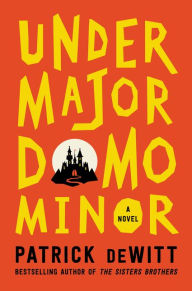E- Versus Print Book Debate a 'Useful' Distraction


 |
|
| Thomas Rabe | |
Bertelsmann is open to buying parts or all of the 47% stake in Penguin Random House that Pearson owns, CEO Thomas Rabe said today while discussing company results with reporters in Germany, as reported by Reuters.
"Publishing has always been at the heart of Bertelsmann and it always will be," Rabe said. "We could imagine raising our stake in Penguin Random house in steps." He added: "It is up to Pearson whether they want to sell or not."
Under the merger agreement between Pearson and Bertelsmann that created Penguin Random House in October 2012, each owner must hold its stake for three years and thereafter has right of first refusal.
Speculation has risen that Pearson may want to sell following the company's recent sale of the Financial Times and its stake in the Economist to focus on education.
Reuters estimated Pearson's stake in Penguin Random House to be worth about €2.5 billion ($2.8 billion).

Danelle Vance, who bought the store two years ago and once managed a Crown Books in Emeryville, said that the shop "can't compete with online" and that she can't continue to manage both the bookstore and "a growing screen printing operation." The store sells new, used and antique books and many gift items.
---
 Less than two years after opening, Ancestry Books, Minneapolis, Minn., is closing its bricks-and-mortar store on September 26, the store announced on Facebook. It will continue to host events and "in a couple months will have a new online store."
Less than two years after opening, Ancestry Books, Minneapolis, Minn., is closing its bricks-and-mortar store on September 26, the store announced on Facebook. It will continue to host events and "in a couple months will have a new online store."
Owners Verna Wong and Chaun Webster cited difficulties with their landlord for the decision: being put on a month-to-month lease since June 1 and the landlord's firing of the management of the Lowry Café and closing it until it finds new management. They wrote: "Eddie Hutchins, who managed at the Lowry Cafe for three year, has been a huge supporter of Ancestry Books, and was also in negotiations with the owner to purchase the Lowry Cafe. We are not only displeased with this practice on the part of the owner, who we lease from, but we can no longer in good conscience continue with this relationship."
Ancestry Books is "a family-friendly bookstore offering reading material focused on authors of color, queer theory authors of color, children's books, urban planning, and other writers with unique voices," City Pages wrote.
 The American Booksellers Association has added staff members Gen de Botton and Teresa Pereira Neufeld, Bookselling This Week reported.
The American Booksellers Association has added staff members Gen de Botton and Teresa Pereira Neufeld, Bookselling This Week reported.
As ABA's program and development coordinator, de Botton will work with development officer Mark Nichols and senior program officer Joy Dallanegra-Sanger as a liaison between publishers and member booksellers. In a newly created position that replaces and builds upon the role of the industry relations assistant, she will support all ABA publisher-related programs and initiatives. She may be reached at 800-637-0037, ext. 7545, or Gen@bookweb.org.
Pereira Neufeld, who recently joined ABA's staff as a part-time graphic designer, said she "will be doing a lot of creative design and working with [membership and marketing officer] Meg Smith on brochures, pamphlets, posters, signage and other print material. I'll also be working with [ABA director of technology] Greg Galloway on page design and creative visuals for ABA's websites."

The collection of essays, which appears on September 10, is published by Switch Publishing. Kinokuniya is distributing it to its own stores, as well as to other bookstores throughout Japan, via wholesalers.
The initiative is part of a joint venture between Kinokuniya and Dai Nippon Printing Corporation called Publication Marketing Innovation Japan, which focuses on non-returnable and direct ordering from publishers. It aims, Kinokuniya said, to "reinvigorate the existent book distribution market while competing with online book retailers by distributing a great proportion of volume available from the first print-run through the domestic bookstore network."
Kinokuniya said that the purchase of most of the first printing "is not meant to monopolize" Murakami's essay collection: Novelist as a Vocation will be available at many non-Kinokuniya bricks-and-mortar bookstores.
A major book distributor told the Japan Times that it "would be great" if the strategy helps bring the likely bestseller to indie bricks-and-mortar booksellers. "Small bookshops have always had difficulty obtaining major releases," he said. "I've often heard about these shops buying books at selling prices just to bring them to their patrons."
And Tsuneo Matsushita, vice-manager of Sanseido Bookstore's main outlet in the Jinbocho district of Tokyo, said Kinokuniya's strategy "makes sense." He added that the Sanseido chain is buying copies of Novelist as a Vocation from Kinokuniya at 70% off list price, cheaper than usual avenues, but it will pay the cost of distributing its purchases to all of its outlets in Japan. "I don't think we are particularly better off buying them from Kinokuniya," Matsushita said.
Internationally renowned neurologist and author Oliver Sacks, "who explored some of the brain's strangest pathways in bestselling case histories like The Man Who Mistook His Wife for a Hat, using his patients' disorders as starting points for eloquent meditations on consciousness and the human condition," died yesterday, the New York Times reported. He was 82. Sacks had announced last February in an Op-Ed essay that he was in the late stages of terminal cancer, and continued to chronicle his final months, including a compelling piece in the July 24 edition of the Times headlined "My Periodic Table."
As a medical doctor and writer, Sacks "achieved a level of popular renown rare among scientists," the Times noted. His many books include Awakenings, An Anthropologist on Mars, The Mind's Eye, The Island of the Colorblind, Musicophilia, Seeing Voices and his recent memoir, On the Move: A Life.
In a retrospective appraisal, Times book critic Michiko Kakutani wrote: "It's no coincidence that so many of the qualities that made Oliver Sacks such a brilliant writer are the same qualities that made him an ideal doctor: keen powers of observation and a devotion to detail, deep reservoirs of sympathy, and an intuitive understanding of the fathomless mysteries of the human brain and the intricate connections between the body and the mind."
When he revealed his disease last winter, Sacks observed: "I cannot pretend I am without fear. But my predominant feeling is one of gratitude. I have loved and been loved; I have been given much and I have given something in return; I have read and traveled and thought and written. I have had an intercourse with the world, the special intercourse of writers and readers.
"Above all, I have been a sentient being, a thinking animal, on this beautiful planet, and that in itself has been an enormous privilege and adventure."
---
Wayne Dyer, who "turned his 1976 bestseller Your Erroneous Zones into a self-help empire," died on Saturday, the Wrap reported. He was 75.
Dyer wrote more than 30 books, including The Power of Intention and Stop the Excuses! How to Change Lifelong Thoughts. His philosophy was that positive, happy thoughts lead to a positive, happy life.
A psychotherapist and former professor at St. John's University in New York City, Dyer was a friend of Oprah Winfrey and Ellen DeGeneres and appeared frequently on their shows.
 Elizabeth Gilbert can now add record-breaking booksigner to her résumé. She was at the Penguin Random House warehouse in Westminster, Md., last week where she signed more than 20,000 copies of her forthcoming Big Magic in two days. These copies will go out to indie stores hosting events across the country, including Malaprop's, Bookshop Santa Cruz and Magers & Quinn.
Elizabeth Gilbert can now add record-breaking booksigner to her résumé. She was at the Penguin Random House warehouse in Westminster, Md., last week where she signed more than 20,000 copies of her forthcoming Big Magic in two days. These copies will go out to indie stores hosting events across the country, including Malaprop's, Bookshop Santa Cruz and Magers & Quinn.
 Congratulations to Valley Bookseller, Stillwater, Minn., which is celebrating its 25th anniversary next week. To thank "loyal customers and great tourists in our river town," the store will have daily drawings for prizes, a small gift with each purchase and treats in-store, starting Monday, September 7. Then on Saturday, September 12, the store will discount all books 25% for the day and from 6-9 p.m. will have an open house at the Lowell Inn Banquet Center. At least 40 local authors will be in attendance, and William Kent Krueger will emcee the evening, which will also feature prizes, appetizers and champagne.
Congratulations to Valley Bookseller, Stillwater, Minn., which is celebrating its 25th anniversary next week. To thank "loyal customers and great tourists in our river town," the store will have daily drawings for prizes, a small gift with each purchase and treats in-store, starting Monday, September 7. Then on Saturday, September 12, the store will discount all books 25% for the day and from 6-9 p.m. will have an open house at the Lowell Inn Banquet Center. At least 40 local authors will be in attendance, and William Kent Krueger will emcee the evening, which will also feature prizes, appetizers and champagne.
 SF Weekly included Books Inc. in a story on 10 of the oldest businesses in San Francisco, writing: "In 1851, Anton Roman made big money off of the Gold Rush and decided to open Shasta City bookshop (inaugurating the first San Francisco locale in 1857). Roman began publishing books by literary greats such as Bret Harte and Mark Twain in 1863, but eventually sold the shop in 1880. After changing owners several times, losing its Montgomery Street location to the 1906 earthquake, and numerous name changes, the shop, now called Books Inc., reemerged in the Fairmont Hotel in 1946. Today, Books Inc. stands as the West Coast's oldest independent bookseller, with 11 California stores (four of them in San Francisco). Seeing as several of our city's bookstores have vanished over the years, that's quite the feat."
SF Weekly included Books Inc. in a story on 10 of the oldest businesses in San Francisco, writing: "In 1851, Anton Roman made big money off of the Gold Rush and decided to open Shasta City bookshop (inaugurating the first San Francisco locale in 1857). Roman began publishing books by literary greats such as Bret Harte and Mark Twain in 1863, but eventually sold the shop in 1880. After changing owners several times, losing its Montgomery Street location to the 1906 earthquake, and numerous name changes, the shop, now called Books Inc., reemerged in the Fairmont Hotel in 1946. Today, Books Inc. stands as the West Coast's oldest independent bookseller, with 11 California stores (four of them in San Francisco). Seeing as several of our city's bookstores have vanished over the years, that's quite the feat."
 |
|
| Battaglia | |
Publishing industry veteran Emi Battaglia has founded Emi Battaglia Public Relations, a full-service publicity, marketing and literary consultation firm. EBPR specializes in commercial fiction and nonfiction titles, celebrity, newsmakers, inspirational and pop culture titles. Battaglia was most recently director of marketing and publicity at Regan Arts (a Phaidon Global company). Before that, she was v-p, associate publisher and marketing director, at Hachette Book Group, and earlier worked at Simon and Schuster, Goldberg McDuffie Communications and St. Martin's Press. EBPR may be reached at ebpr@yahoo.com or visit Emi Battaglia Public Relations.

This morning on the Today Show: Brené Brown, author of Rising Strong (Spiegel & Grau, $27, 9780812995824).
---
This morning on CBS This Morning: Dick Cheney and Liz Cheney, authors of Exceptional: Why the World Needs a Powerful America (Threshold Editions, $28, 9781501115417). They will also appear today on Hannity and tomorrow morning on Fox & Friends.
---
Today on Fresh Air: Jonathan Franzen, author of Purity (Farrar, Straus and Giroux, $28, 9780374239213).
---
Today on Diane Rehm: Leslie Michelson, author of The Patient's Playbook: How to Save Your Life and the Lives of Those You Love (Knopf, $24.95, 9780385352284).
---
Today on CNBC's Squawk Box: Gillian Tett, author of The Silo Effect: The Peril of Expertise and the Promise of Breaking Down Barriers (Simon & Schuster, $28, 9781451644739). He will also appear tomorrow on Morning Joe, Bloomberg Markets and CNBC's Closing Bell.
---
Tomorrow night on a repeat of the Late Late Show with James Corden: Chris Colfer, author of The Land of Stories: Beyond the Kingdoms (Little, Brown, $18, 9780316406895).
ITV Studios has released the first look at Jekyll & Hyde, an upcoming 10-part action-adventure drama "based on an idea conceived by British actor and author Charlie Higson and inspired by the Robert Louis Stevenson classic," Deadline.com reported. Tom Bateman (Da Vinci's Demons), Richard E. Grant and Natalie Gumede (Coronation Street) star in the series. Higson is writing and will executive produce with ITV Studios' Francis Hopkinson. No airdate has been set at this time.
---
ITV has also released a trailer for the sixth and final season of Downton Abbey. Deadline.com reported that "not much has been publicly revealed about the upcoming farewell, other than it being set in 1925. The teaser above does presage more change at the Abbey as Robert Crawley (Hugh Bonneville) tells Mr. Carson (Jim Carter), 'If I could stop history in its tracks, maybe I would. But I can't, Carson, for neither you nor I can hold back time.' " The PBS Masterpiece debut in the U.S. is scheduled for January 3.
The Case for Loving: The Fight for Interracial Marriage by wife-and-husband team Selina Alko and Sean Qualls (Arthur A. Levine Books) has won the Carla Cohen Free Speech Award, bestowed in honor of the late founder and co-owner of Politics & Prose, Washington, D.C. The New Atlantic Independent Booksellers Association described the book this way:
"This is the story of one brave family: Mildred Loving, Richard Perry Loving, and their three children. It is the story of how Mildred and Richard fell in love, and got married in Washington, D.C. But when they moved back to their hometown in Virginia, they were arrested (in dramatic fashion) for violating that state's laws against interracial marriage. The Lovings refused to allow their children to get the message that their parents' love was wrong and so they fought the unfair law, taking their case all the way to the Supreme Court--and won!"
Undermajordomo Minor by Patrick DeWitt (Ecco Press, $26.99 hardcover, 9780062281203, September 15, 2015)
 After giving the western genre a makeover in his previous novel, The Sisters Brothers, Patrick deWitt conjures up a dark fairy tale worthy of Wilhelm and Jacob Grimm in Undermajordomo Minor, a deliciously off-kilter coming-of-age story.
After giving the western genre a makeover in his previous novel, The Sisters Brothers, Patrick deWitt conjures up a dark fairy tale worthy of Wilhelm and Jacob Grimm in Undermajordomo Minor, a deliciously off-kilter coming-of-age story.
When 17-year-old Lucien Minor, known as Lucy, contracts pneumonia, a stranger comes to his bedside and listens to his desire to live, and for "something to happen." The stranger breathes in Lucy's sickness and then visits his parents' room; the next morning, Lucy is healed and his father is dead of pneumonia. When his mother goes from silently to openly blaming Lucy, a local priest helps him to find housing elsewhere. Always the misfit, a wimp among brutes and a compulsive liar, Lucy leaves his home village of Bury with little fanfare, beyond a passive-aggressive encounter with his ex-girlfriend, before taking up the position of undermajordomo, assisting the chief household steward at the foreboding Castle von Aux.
Lucy finds his new home inhabited by colorful if somewhat disturbing characters. His supervisor, Mr. Olderglough, refuses to tell him what happened to Mr. Broom, the previous undermajordomo. Nearby villagers include Memel and Mewe, an old thief who looks young and a young thief who looks old, respectively; they befriend Lucy but also mock him mercilessly. They introduce Lucy to the lively and exquisite Klara, but to win her heart, he must compete with the obnoxiously handsome and brave soldier Adolphus. The Baron von Aux, Lucy's mysterious employer, is nowhere to be seen, and a feral stranger prowls the castle at night. When the Baron's estranged wife announces her return to the estate, the world turns upside down for its master and staff. Ensuing events thoroughly answer Lucy's wish for something to happen, if not in ways he would have liked.
DeWitt packs his scenes with sprightly banter and quirky circular arguments. His fairy tale world combines elements of the medieval with more modern aspects such as travel by train, creating a partially historic, partially timeless feel. Although readers will find plenty here to chill their spines and possibly turn a few stomachs, a detached levity dances through every moment. One gets the sense that life itself is having a bit of laugh at Lucy's expense, prompting vivid recollections of the pitfalls and pratfalls that come with growing up. Alongside the humor lies a wry wisdom about the hidden strengths of the perpetual outsider. Take special note of this delightful, wickedly sharp gem. --Jaclyn Fulwood, blogger at Infinite Reads
Shelf Talker: A young man seeks his fortune as undermajordomo of a remote and spooky castle in this fable for a modern-day world.